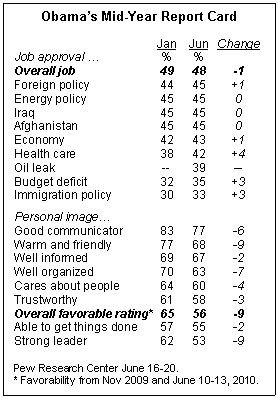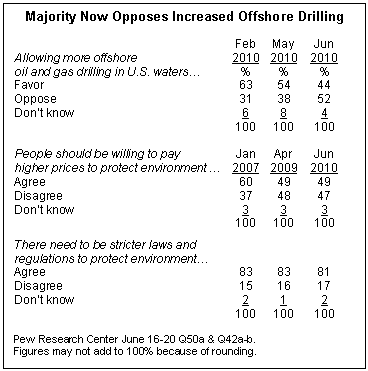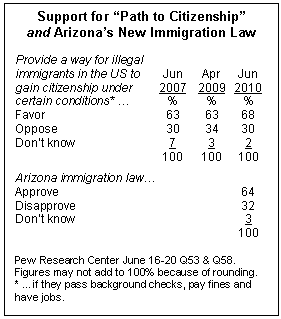Overview
Since the beginning of this year, President Obama has signed a controversial health care measure, coped with a stubbornly high jobless rate, and struggled to manage the largest environmental disaster in the nation’s history. In that period, Obama’s overall job approval rating has moved from 49% to 48%.
 On major issues, ranging from the economy to Afghanistan, Obama’s ratings also have changed little since the beginning of the year. He continues to get his highest ratings on foreign policy, energy policy, Afghanistan and Iraq; Obama gets his worst marks on the budget deficit and immigration.
On major issues, ranging from the economy to Afghanistan, Obama’s ratings also have changed little since the beginning of the year. He continues to get his highest ratings on foreign policy, energy policy, Afghanistan and Iraq; Obama gets his worst marks on the budget deficit and immigration.
His personal image, while not as strong as it was in January, remains generally positive. Fully 77% view him as a good communicator, while 68% see him as warm and friendly and 67% say he is well-informed. On the other hand, ratings for his ability to get things done (55%) and strong leadership (53%) are much lower. The proportion viewing him as a strong leader has declined markedly since February 2009, from 77% to 53%.
Despite these changes, bottom-line attitudes toward Obama’s job performance have changed little in 2010. Nor has Obama’s overall job approval been affected by increasing criticism of his handling of the situation in the Gulf of Mexico, which continues to dominate news coverage and the public’s attention (see “Public Reacts Positively to Extensive Gulf Coverage,” June 22, 2010).
The latest national survey by the Pew Research Center for the People & the Press, conducted June 16-20 among 1,802 adults, finds that 39% approve of Obama’s handling of the oil leak while 52% disapprove. Although his approval mark is little changed from early May (38%), in the initial stages of the disaster, the proportion disapproving of his job in dealing with the leak has risen 16 points (from 36%).
 The survey finds further evidence that the disaster has undermined public support for increased offshore drilling for oil and gas in U.S. waters. Just 44% favor increased offshore drilling, down 10 points since early May and 19 points since February. A majority (52%) now opposes more offshore drilling.
The survey finds further evidence that the disaster has undermined public support for increased offshore drilling for oil and gas in U.S. waters. Just 44% favor increased offshore drilling, down 10 points since early May and 19 points since February. A majority (52%) now opposes more offshore drilling.
Nearly seven-in-ten Democrats (69%) and 51% of independents oppose increased offshore drilling; in February, majorities in both groups favored more offshore drilling. By contrast, most Republicans (63%) continue to favor expanded drilling in U.S. waters, but support has slipped from earlier this year (74% in February).
Yet the public remains divided over whether people should be willing to pay higher prices to protect the environment. Nearly half (49%) agree that they should, while about as many (47%) disagree. That is little changed from April 2009; however, last year’s survey marked the first time in a series of surveys dating to 1992 when a majority did not say that people should be willing to pay higher prices to protect the environment.
 The public also expresses mixed views on immigration policy. There is broad support for Arizona’s new immigration law, which requires police to verify the legal status of someone they have stopped or arrested if they suspect that the person is in the country illegally. By two-to-one (64% to 32%), more favor than oppose the new law.
The public also expresses mixed views on immigration policy. There is broad support for Arizona’s new immigration law, which requires police to verify the legal status of someone they have stopped or arrested if they suspect that the person is in the country illegally. By two-to-one (64% to 32%), more favor than oppose the new law.
At the same time, there is similar level of support for providing a way for illegal immigrants currently in the country to gain legal citizenship if they pass background checks, pay fines and have jobs. Support for the so-called path to citizenship has increased somewhat from last year (from 63% to 68%).
More generally, opinion about immigrants’ impact on the nation’s traditional customs and values has not become more negative in recent years, although increasing numbers see immigrants as a burden because they take jobs, housing and health care. Currently, 50% see immigrants as a burden because of those factors, up from 40% last year.
The survey finds that views of the wars in Afghanistan and Iraq have remained very stable in recent months, a period when both conflicts have received little news coverage and garnered little public interest (it was conducted before Obama accepted Gen. Stanley McChrystal’s resignation as commander of U.S forces in Afghanistan). Nearly six-in-ten (59%) say the United States will definitely or probably succeed in Afghanistan, while about the same percentage (58%) sees success as at least probable in Iraq.


